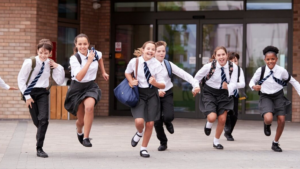Home » Commentary » Opinion » From pandemic to clever country
· Ideas@theCentre
 After much angst, school students have belatedly returned to the nation’s classrooms. But recovery from the educational damage is now being obstructed by progressives’ pursuit of an ‘education new deal.’
After much angst, school students have belatedly returned to the nation’s classrooms. But recovery from the educational damage is now being obstructed by progressives’ pursuit of an ‘education new deal.’
We don’t need a ‘new deal’ on education. What we need is to redouble efforts on becoming the clever country aspired to all those years ago.
Unnecessary — and in many cases, prolonged — school closures have harmed our education prospects.
Recent CIS research has estimated the damage to students’ progress in literacy and numeracy — with disadvantaged students falling up to three weeks further behind over the period schools were closed.
Recovering this lost learning is achievable, but cannot be treated with complacency.
Yet, education progressives have opportunistically leapt upon the pandemic to argue “the time is right to transform schools” in a more progressive image.
In particular, that involves overhauling what students learn, how progress and performance is (not) tracked, and privileging social and emotional wellbeing over learning.
But this would only further deteriorate the quality, rigour, and outcomes of the long-suffering education system.
Policymakers and schools will need to combat the concerted efforts of progressives if there’s any hope of a V-shaped educational recovery.
And that’s indispensable in Australia coming from the pandemic and toward a more prosperous future — since education is key to securing long-term human capital potential on the supply side of the economy.
To get there, priorities must be: promptly identifying students’ learning gaps; assessing schools’ pandemic responsiveness; ensuring flexible school funding to address identified needs; and constructively leveraging technology.
As in the past, it’s wrong to conclude more funding is needed to fuel the recovery.
Nonetheless, it hasn’t taken long for the usual, predictable lobbying for school funding boosts to bolster the educational rescue; with unwarranted calls for smaller classes, more teachers’ aides, and overtime pay for teachers. Another proposal is for extra ‘catchup funding’ to right the course, particularly using taxpayer money to back expensive approaches supported by little evidence.
But existing funding — which is significantly more than in previous years anyway — is more than adequate for the task.
What’s needed is not more money, but more flexibility. Schools face vastly different challenges — including varied success with home-based learning efforts — and need the autonomy to address them as appropriate.
As with so many areas, policymakers’ decisions as we emerge from the pandemic will define the educational and economic trajectory for years to come.
We’ve belatedly flattened the curve on lost learning with the return to school. A V-shaped education recovery is possible, but we can’t let the progressives slam the brakes on it.
This is an edited extract of an opinion piece published in the Canberra Times as Towards a V-shaped educational recovery.
From pandemic to clever country